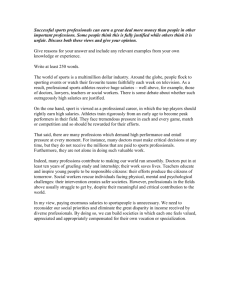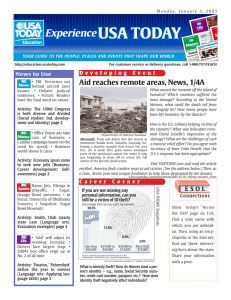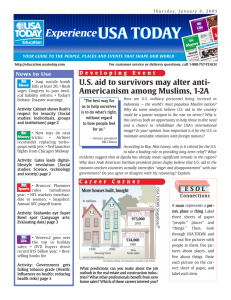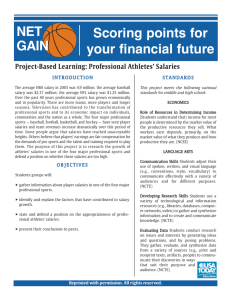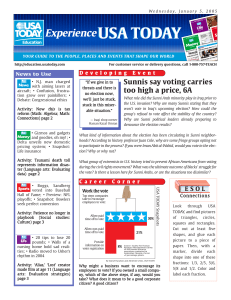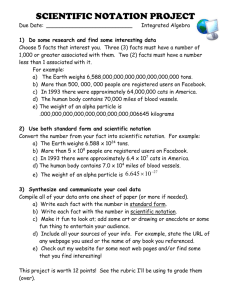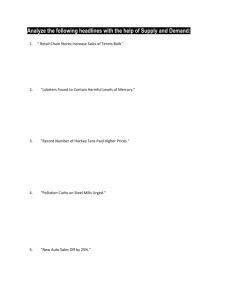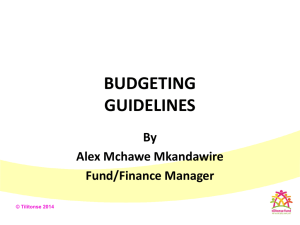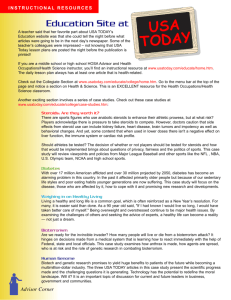Experience - USA Today
advertisement
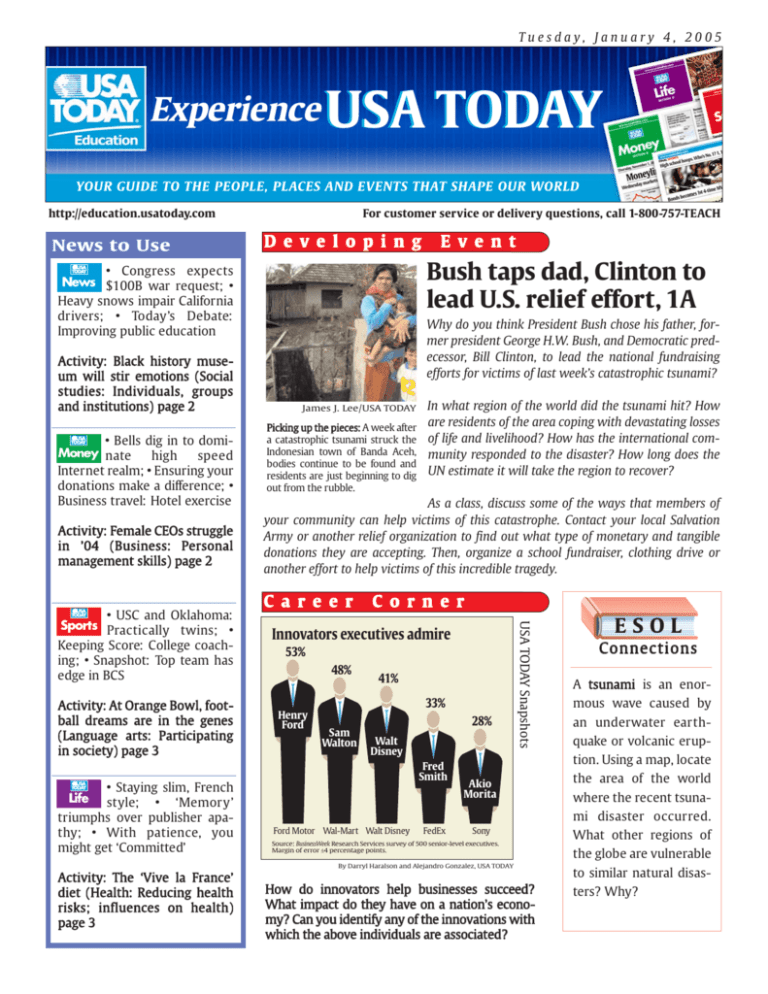
Tuesday, January 4, 20 05 Experience USA TODAY YOUR GUIDE TO THE PEOPLE, PLACES AND EVENTS THAT SHAPE OUR WORLD http://education.usatoday.com News to Use For customer service or delivery questions, call 1-800-757-TEACH D e v e l o p i n g Bush taps dad, Clinton to lead U.S. relief effort, 1A • Congress expects $100B war request; • Heavy snows impair California drivers; • Today’s Debate: Improving public education Activity: Black history museum will stir emotions (Social studies: Individuals, groups and institutions) page 2 • Bells dig in to dominate high speed Internet realm; • Ensuring your donations make a difference; • Business travel: Hotel exercise Activity: Female CEOs struggle in ’04 (Business: Personal management skills) page 2 Activity: At Orange Bowl, foot ball dreams are in the genes (Language arts: Participating in society) page 3 • Staying slim, French style; • ‘Memory’ triumphs over publisher apathy; • With patience, you might get ‘Committed’ Why do you think President Bush chose his father, former president George H.W. Bush, and Democratic predecessor, Bill Clinton, to lead the national fundraising efforts for victims of last week’s catastrophic tsunami? James J. Lee/USA TODAY Picking up the pieces: A week after a catastrophic tsunami struck the Indonesian town of Banda Aceh, bodies continue to be found and residents are just beginning to dig out from the rubble. In what region of the world did the tsunami hit? How are residents of the area coping with devastating losses of life and livelihood? How has the international community responded to the disaster? How long does the UN estimate it will take the region to recover? As a class, discuss some of the ways that members of your community can help victims of this catastrophe. Contact your local Salvation Army or another relief organization to find out what type of monetary and tangible donations they are accepting. Then, organize a school fundraiser, clothing drive or another effort to help victims of this incredible tragedy. C a r e e r C o r n e r Innovators executives admire 53% 48% Henry Ford 41% 33% Sam Walton 28% Walt Disney Fred Smith Ford Motor Wal-Mart Walt Disney FedEx USA TODAY Snapshots • USC and Oklahoma: Practically twins; • Keeping Score: College coaching; • Snapshot: Top team has edge in BCS E v e n t Akio Morita Sony Source: BusinessWeek Research Services survey of 500 senior-level executives. Margin of error ±4 percentage points. By Darryl Haralson and Alejandro Gonzalez, USA TODAY Activity: The ‘Vive la France’ diet (Health: Reducing health risks; influences on health) page 3 How do innovators help businesses succeed? What impact do they have on a nation’s economy? Can you identify any of the innovations with which the above individuals are associated? ESOL Connections A tsunami is an enormous wave caused by an underwater earthquake or volcanic eruption. Using a map, locate the area of the world where the recent tsunami disaster occurred. What other regions of the globe are vulnerable to similar natural disasters? Why? E x p e r i e n c e U S A T O DAY Black histor y m useum will stir emotio ns, 3A STANDA RD: So cial studies: In dividuals, groups DISCUSSION: W and institutions hat topics will th e Na tional Museum African-American of Histor y and Cu lture address? Rep. John Lewis’ What is vision for the pr oj ect? Why is th um just now be e musecoming a reality ? Why is it impo th e mus eum rt ant that “repre sent th e diversit y of th American experi e blac k ence”? AC TI V IT Y: In sm all groups, brains torm a list of th that African-Am e ways erican culture ha s shaped life in th Next, imagine th e U.S. at you are desig ning the entrance the new black Am hall for erican culture bu ilding. Your goal make visitors im is to mediately feel th at the museum ing, breathing pl is a “livace.” Decide wha t people would sense, touch, et se e, hear, c., as they entere d the museum. your ideas in wri Describ e ting, and share th em with peers. Tuesday, January 4, 20 05 q Page 2 W I S E RD TES T PR EP Define the following words as used in the article: Female CEOs struggle in ’04, Money, 3B 1. collective 2. blowout 3. proxy 4. ambiguity 5. echelons Female CEOs struggle in ’04, 3B 6. tempered management skills STA NDA RD: Business: Personal 5. tiers; ranks 4. uncertainty; obscurity 3. written authorization to act in place of another 2. spree; celebration 1. a number of individuals taken as a whole or group ANSWERS: Best Man for the Job Is a ACTIVI TY: In the book, Why the an says, “No one is smart Woman,* eBay CEO Meg Whitm and make them right over a enough to make all the decisions e to have a … team … that ver y long period of time. You hav ard-thinking.”* Identify a can … be forward-looking and forw community, state or nation. difficult problem in your school, a team that will solve the Next, imagine that you must form attributes and expertise of problem. Consider the personal hers, coaches, etc. Decide your friends, family members, teac ld want on your team, and which four individuals you wou explain your choices in writing. 6. moderated; calmed; made milder agement experts believe DISCUSSION: Why do some man than their male counterthat women CEOs perform better executives face? parts? What pressures do female E x p e r i e n c e U S A T O DAY Tuesday, January 4, 20 05 q Page 3 This Day In History s are Football dream A in the genes, 1-2 ating in society uage arts: Particip ng La : RD DA otball players STAN obable ab out fo hat is impr y to this year’s DISCUSSION: W Tatupu’s jour ne fa Lo d an s y’ le ble athlete? Mark Brad each a remarka es ak m t ha W otball? In Orange Bowl? sion I college fo vi Di to in k ea br their How did they tupu following in Ta d an y le ad Br th what ways are bo s? ep st ot fathers’ fo nt was once er path of a pare re ca e th g in w niche. AC TI V IT Y: Follo a person’s job ng hi is bl ta es of the day-to -day a common way parents ab out ur yo of th bo ucation and Interview as well as any ed , bs jo r ei th of eir careers. requirements to launching th r io pr ed iv ce g in the training they re rested in followin te in be ld ou w u g, explain why or After, decide if yo parents. In writin ur yo of e on of footsteps ur decision. ree reasons for yo why not, citing th January 4 q In 1904, the Supreme Court ruled that Puerto Ricans were not aliens and could enter the United States freely; however, the court stopped short of declaring them U.S. citizens. q In 1951, during the Korean conflict, North Korean and Communist Chinese forces captured the city of Seoul. q In 1960, French author Albert Camus died in an automobile accident at age 46. q In 1965, poet T.S. Eliot died in London at age 76. q In 1965, President Johnson outlined the goals of his "Great Society" in his State of the Union Address. T he ‘Vive la Fra nce’ diet , 6D STANDA RD: He alth: Reducin g health risks; in fluences on health DISCUSSION: Ho w does the Fren ch approach to weight loss differ diet and from the Americ an one? Which do is more pr uden yo u think t? According to French author Guiliano, how co Mireille uld American wom en change their about food? Why mindset should they do th is? What are som mon American “fo e comod offenders”? W hat role do parent teaching their ch s play in ildren proper nutr ition and eating ha bits? AC TIVI TY: For the next four wee ks, keep a food di tracks all of the fo ar y that ods and beverage s that you ingest (Note the amount ea ch day. s, as well as the tim e of each snack or At the end of each meal.) week, identify yo ur key food offend work on cutting ba er s, and ck on each in the following week. Af weeks, evaluate te r four your progress an d describe any and/or emotiona ph ysical l changes that oc curred. q In 1974, President Nixon refused to hand over tape recordings and documents subpoenaed by the Senate Watergate Committee. In describing his vision of the “Great Society,” President Johnson said, “We do not intend to live in the midst of abundance, isolated from neighbors and nature, confined by blighted cities and bleak suburbs, stunted by a poverty of learning and an emptiness of leisure. The Great Society asks not how much, but how good; not only how to create wealth but how to use it; not only how fast we are going, but where we are headed.”* 1.) Explain Johnson’s vision. Do you think the USA has truly become a “great society”? Explain why or why not, citing one example from today’s paper to support your opinion. *Source: www.c-span.org E x p e r i e n c e U S A T O DAY Tuesday, January 4, 20 05 q Page 4 Community & Family EXTRA CREDIT ! New Year’s resolution: An activities diet, 15A Why has writer William R. Mattox Jr. decided to go on an activities diet? How are extracurricular activities similar to the four food groups? According to social scientist William Doherty, what experiences do families miss when children are overscheduled? Why is it important for kids to experience unstructured free time? What factors have fueled the increase in struc- tured activities? Why does Mattox call modern parenthood a “competitive sport”? Do you agree with this assessment? Talk to your family during dinner one night this week. List the activities in which each person is involved. Are any of them interfering with dinners, vacations or other family time? Could your family benefit from an activities diet? Athletes’ Salaries OBJECTIVES P r oj e c t - B a s e d Students groups will: ugather information about player salaries in one of the four major professional sports. uidentify and explain the factors that have contributed to salary growth. ustate and defend a position on the appropriateness of professional athletes’ salaries. upresent their conclusions to peers. Week 1 ch Resear L ear ning I N S T R U C T I O N S : The average NBA salary in 2003 was 4.9 million; the average baseball salary was $2.37 million; the average NFL salary was $1.25 million. Over the past 40 years, professional sports has grown economically and in popularity. There are more teams, more players and longer seasons. Television has contributed to the transformation of professional sports and to its economic impact on individuals, communities and the nation as a whole. The four major professional sports — baseball, football, basketball, and hockey — have seen player salaries and team revenues increase dramatically over this period of time. Some people argue that salaries have reached unacceptable heights. Others believe that players’ earnings are fair compensation for the demands of pro sports and the talent and training required to play them. The purpose of this project is to research the growth of athletes’ salaries in one of the four major professional sports and then defend a position on whether these salaries are too high. During this week you should research and gather as much information as you can about the salaries of players in one of the four major professional sports. Peruse USA TODAY’s salary databases (see addresses listed below) and other sources for information on pro athletes’ salaries now and in past decades. Then, research the earnings of five other occupations, that in your opinion, require skills or training comparable to an athlete’s. (See the Department of Labor’s Occupational Outlook Handbook at the link below.) Record your data and reflections, and discuss them as a group. Baseball: http://asp.usatoday.com/sports/baseball/salaries/default.aspx Football: http://asp.usatoday.com/sports/football/nfl/salaries/default.aspx Basketball: http://asp.usatoday.com/sports/basketball/nba/salaries/default.aspx Hockey: http://asp.usatoday.com/sports/hockey/nhl/salaries/default.aspx Occupational Outlook Handbook: http://www.bls.gov/oco/ STANDARDS This project meets the following national standards for middle and high school: Economics: Role of Resources in Determining Income (Students understand that) income for most people is determined by the market value of the productive resources they sell. What workers earn depends, primarily, on the market value of what they produce and how productive they are. (NCEE) Language Arts: Evaluating Data Students conduct research on issues and interests by generating ideas and questions, and by posing problems. They gather, evaluate, and synthesize data from a variety of sources (e.g., print and nonprint texts, artifacts, people) to communicate their discoveries in ways that suit their purpose and audience. (NCTE) Student Challenge on ... Health USA TODAY Snapshots Choosing alternative medical approaches Percentage of age groups that prefer alternative/ holistic approaches to standard medicinal practices: 18% 18 - 34 35 - 49 24% 50 - 64 65 and older 23% 15% Source: MARS 2004 OTC/DTC Survey; based on over 21,000 responses By Shannon Reilly and Marcy E. Mullins, USA TODAY APPLICATIONS: analysis, evaluation American Holistic Health Association President Suzan Walter writes, “Holistic Health is actually an approach to life. Rather than focusing on illness or specific parts of the body, this ancient approach to health considers the whole person and how he or she interacts with his or her environment. It emphasizes the connection of mind, body, and spirit … people accept responsibility for their own level of well-being.”* How does this approach differ from standard medical practice? Why might many people still be skeptical of holistic treatments? Why do you think middle-age adults are more supportive of alternative therapies than young adults and seniors? Do you predict that the popularity of holistic medicine will increase or decrease in the coming decade? Explain. For what kinds of ailments, if any, would you be willing to try a holistic approach? What are the advantages of treating the “whole person”? The disadvantages? *Source: The Illustrated Encyclopedia of Body-Mind Discipline, excerpted at ahha.org/rosen.htm 4 Get an Acrobat PDF version of “Experience USA Today” at our Web site: http://education.usatoday.com — click on “Daily Lesson Plan.” 4 Experience USA TODAY, developed by USA TODAY Education, is written and edited by Mary Barnes and Maria Dubuc. To send your feedback, e-mail education@usatoday.com or call 1800-USA-3415, ext. 5949.
